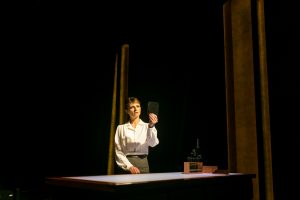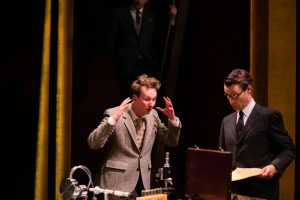Ensemble Theatre, September 7
8/10
It’s a tragedy spiralling in tandem with “what if?” questions. Anna Ziegler’s 2008 play, here having its Australian premiere, provides a fictionalised account of the malfunctioning relationships that resulted in Rosalind Franklin, who died at 37 of ovarian cancer, not posthumously sharing in one of two Nobel Prizes that arguably should have been hers. This was awarded to three of her colleagues for the discovery of the double helix structure of DNA.
Unlike that structure, Ziegler’s two spirals touch each other constantly. Franklin has the potentially tragic flaw of being stern, withdrawn and obsessive. Ziegler explores the degree to which her professional manner was a matter of personality or resulted from being a female physicist in a robustly male domain.

The play’s almost spectacular fluidity between “scenes” helps turbocharge its narrative momentum. Time and space are placed in limbo, as the characters variously enact, remember, postulate, gate-crash each other’s scenes, or comment on the action like a Greek chorus that’s caught a contagious sense of humour. The comedy implicit in the drama is routinely frosted with a what-might-have-been sadness, as the walls we build around us prevent interactions that, at the very least, might have provided fleeting happiness for Franklin, and at best, may have made important work unfold more efficiently.
She comes to King’s College London in 1951: a time when her colleague, Maurice Wilkins, can take lunch in the common room, but she, as a woman, cannot. Her appearance and aloofness is much remarked upon by the surrounding male tribe in a way that, among themselves, is restricted to adverse comments on the livewire Watson’s unruly hair. Franklin is unshakably resolute about the quality of her own work, but has a deep suspicion of collaboration and closeness with the prowling male pack.
Director Anna Ledwich’s compelling production has Amber McMahon plating herself in Franklin’s armour to ward off the men’s attentions, jibes and intellectual pilfering. Unlike some of her less rigorous fellow researchers, she is obsessive about methodology; about making theory and reality align. In a finely drawn rendition of a challenging role, McMahon’s eyes take on a steely glint and her voice and body a forbidding stiffness, even as she gives us blink-and-you-miss-them glimpses of the vulnerability beneath the armour.

Just as good – other than for a slightly wandering accent – is Garth Holcombe’s Maurice Wilkins, who is portrayed as having a crush on Franklin which he can’t express other than by rather pathetically buying her chocolates. Holcombe gives us a Wilkins who is tight-lipped, bespectacled, pompous and just as repressed as Franklin in his way.
Gareth Yuen is an amusing Gosling, Franklin’s research assistant who actually takes “photograph 51”, the x-ray that points to the structure of DNA. The other characters, Crick, Caspar and Watson (the latter raising sexism to the level of a science) are played by Robert Jago, Jake Speer and Toby Blome, respectively. The production’s flaw is that these three characters have been somewhat exaggerated as if to help define them (as can happen with the minor roles in Macbeth). The play’s flaw is that both Franklin and Wilkins have speeches about Wilkins’ failed marriage that stretch beyond the credible province of the characters.
Emma Vine’s commendable set is all donnish windows and drawers, the one looking out on to the world, and the other storing the knowledge thereby accumulated. The sad fact, the play tells us, is that humanity’s competitive instinct can distort our grasp of the truth embedded in that knowledge.
Until October 8.